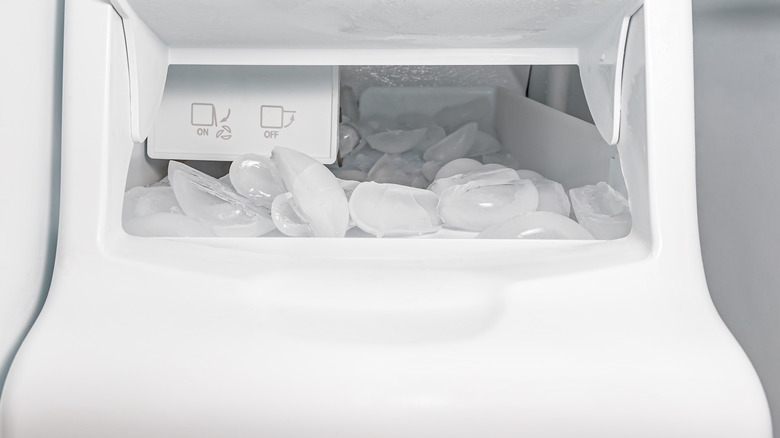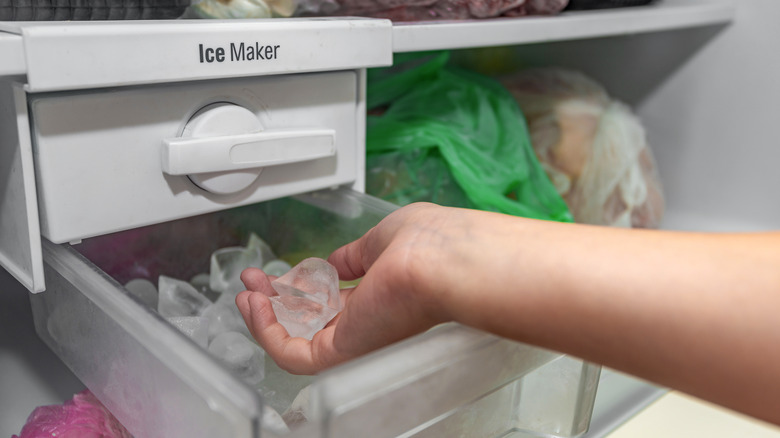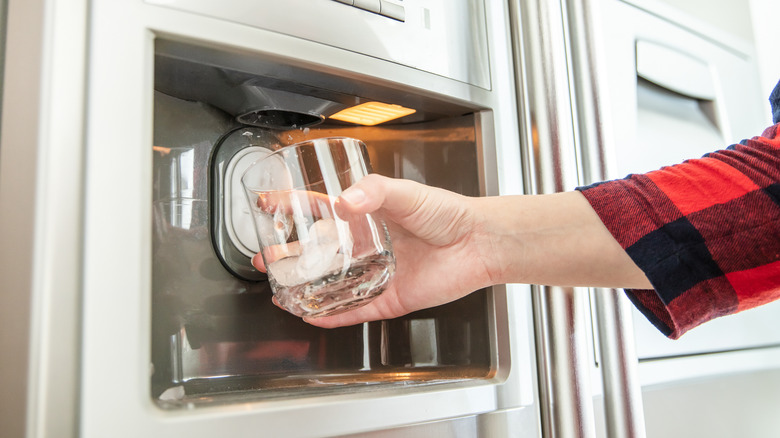The Secret Ingredient Your Icemaker Is Missing For Ultimate Cleanliness
Whether you have a countertop ice maker or an ice maker in your refrigerator, you may not know that lurking in those cubes of perfectly frozen water are bacteria, mold, and mildew. As a constantly moist area, these ice makers are prone to the overabundant growth of bacteria, some of which can survive the very cold freezing temperatures and ultimately make you sick. One solution to this is to use hydrogen peroxide as a tool for cleaning your icemaker. It could create the ultimate level of cleanliness in some of these systems.
Mold and mildew will grow rapidly in an icemaker under the right conditions. If you store your countertop icemaker for the winter and there's even a small amount of water or debris in it, the area will start to develop unsightly mold growth and bacteria. In this situation, you shouldn't use that icemaker until you've done all you can to rid it of any lingering bacteria or mold completely. Simply washing it with soap and water isn't enough to create a truly safe level of cleaning. The use of bleach may be an option, but for those who want less toxic options, hydrogen peroxide can prove to be a very effective method. You can use this method on your refrigerator icemaker, just be sure to follow the manufacturer's recommendations for properly cleaning and sanitizing your system first.
Cleaning an icemaker with hydrogen peroxide can be safe to do
Hydrogen peroxide is often used as an antiseptic on open wounds. It works to kill the pathogens present on the skin without damaging it through the process of oxidation, which ultimately disrupts and kills off the pathogens present. Though hydrogen peroxide is just water with an extra oxygen molecule (therefore making it safe for most people to be exposed to), it is a powerful oxidizing agent. When it's used, it fizzes thanks to the oxidation process, and as that happens, it quickly breaks down bacteria and molds.
It's used for a variety of purposes, including in hospital settings as an antibacterial, in manufacturing locations to clean rubber and plastics, and even as a component of rocket fuel. Because it can remove germs so well without damaging the device, it's a wise choice for the complexities of most icemakers. You can use it on and in electronic systems to help remove bacteria and debris rather effectively, which overcomes one of the challenges of the icemaker.
Ingesting hydrogen peroxide isn't ideal and can be dangerous in large concentrations. Even store-bought products can cause some damage to your stomach or lead to tissue damage when swallowing them. For that reason, if you use this method for cleaning your icemaker, be sure to rinse and allow it to dry fully and then discard the first few ice cubes just to be safe.
How to use hydrogen peroxide to clean your icemaker
As noted, always follow the steps and requirements set by the manufacturer to help protect your warranty. To use hydrogen peroxide, start by unplugging the system to ensure there's no risk of shock to you. You'll then need to pull apart all of the components that get wet. That includes the interior components, seals, and paddles within the icemaker. Each system is very different, so it's important to work through your system step-by-step to remove all the components possible.
Once you do this, take those parts to the sink and wash them using a mild dish detergent or a produce like Castile soap, one that is more holistic than others. Then, hydrogen peroxide can be applied and allowed to go to work, fizzing at any surfaces where organic material is present. You can then use a simple cotton swab dipped into the hydrogen peroxide to rub around all of the edges within the machine. That includes the gaskets, water lines, and other areas where mold or bacteria could have become present.
You'll want to be as thorough as possible when cleaning your icemaker like this. That's going to give you the highest level of results. Once done, use a dry paper towel on the surfaces to remove excess material and loose bacteria. The process of cleaning your icemaker doesn't have to be challenging, but it's essential to keep you and your family drinking clean, healthy water.


